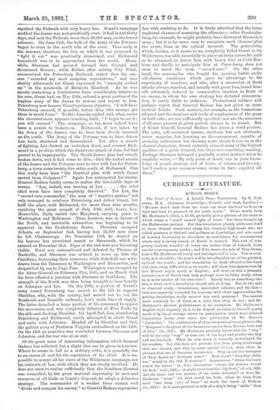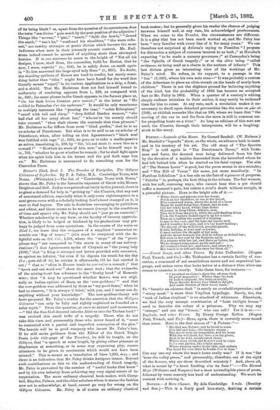CURRENT LITERATURE.
SCHOOL BOOKS.
The Iliad of Homer. A Literal Prose Translation. By II. Hail- stone, M.A. (Johnson, Cambridge; Cornish and Sons, London)— " He tore much hair from the roots out from his head to Zeus on high and loud he groaned in his noble heart." These words from Mr. Hailstone's //iad, x. 15-16, probably give a picture of the state to which many a "youth unwed light of heart" has been brought by the Hailstonian method. For this translation plainly addresses itself to those ill-used wanderers along the classical high-roads who are called pasamen at Oxford, and polltnen at Cambridge, and who stand
at London University or elsewhere as candidates for examinations where only a saving smack of Greek is wanted. This sort of tem- porary student, trustful of every one rather than of himself, looks out for contemporary guides ; and if he wants the tale of Troy divine,'
here is Mr. Hailstone all ready and waiting to tell it him. This is evid- ently as it should be; the youth will be introduced to one of the greatest
epics of the world ; and the translation he finds offered to his hand will clear away difficulties as he reads ; will show him approximately bow Homer might speak in English ; will leave in him a pleasant reminh.cence of Greek that may perhaps issue in fuller study, when be is more master of his own time ? Surely this or something like this is what such a translation should aim at doing. But do the aids
to classical study—translations, annotated editions, and the like—
that are expressly compiled for learners with short opportunities for getting knowledge, really answer any such purpose ? The answer
must certainly be of them as a class that they do not ; and Mr.
Hailstone's present performance is no exception. Mr. Hailstone's English style is partly (it is to be hoped) peculiar to himself, partly marked by those strange views on punctuation which have infested
Cambridge books ever since the publication of Mr. Munro's "Lucretius." The combination of these elements gives us phrases like " Marpessa's daughter of the beauteous nudes from Evenus born and of Idas " (ix., 557). Mr. Hailstone probably knows that his " way " will be the only " way " to nine out of ten boys and youths who buy and use his book. What he sets down is virtually stereotyped for his readers. Yet this does not prevent him from giving renderings that are absurd, and this, by some special ill-luck, most often in phrases that are of frequent recurrence. Why should the besiegers of Troy figure as "Achaeart sons ? " How would " Israelitio child- ren" sound in the Old Testament ? Agamemnon "wraps his tunic round his breast" (x, 21) ; Idomeneus "wraps his armour round his flesh" (xiii., 241),—it might have been his "lily flesh," cf. xiii., 830. Are the tunic and the armour of the same material ? or does Mr. Hailstone " wrap " his shirt round his flesh, when he rises from such "fine knap [sic] of linen" as made the couch of Phoanix (ix., 661) ? Is it more poetical to talk of a ship's being " sable " than of its being black ? or, apart from the question of its correctness, does the term "sea divine" gain much by the post-position of the adjective ? Things like " sovran," "'gan," "neath," "fulfil the bowls," "dewed the earth," "can't be," "confound his shoulders," "the wave refla- sal" are tawdry attempts at poetic diction which become the more ludicrous when seen in their intensely prosaic context. Mr. Hail- stone indeed cannot be accused of anything more than attempted heroics. If in one sentence he soars to the height of "Not all his designs, I trow, shall Zeus, the counsellor, fulfil for Hector, that he now, I wean, expects" (x., 104), he is safely down on earth again in "To him answered the large-eyed lady Here" (i., 551). No doubt, the standing epithets of Homer are hard to render, but surely some- thing better than " trim " might have been found for the word that literally means "equal," in its various applications to a ship, a feast, and a shield. That Mr. Hailstone does not feel himself bound to uniformity of rendering appears from i., 628, as compared with ix., 620; the same phrase in the Greek appears in the former place as, "On his dark brows Cronion gave assent ;" in the latter as "He nodded to Patroclus o'er his eyebrows." It would be only wearisome to multiply instances like "pouring the tear," "noble Ethiopians," "sated with toil and sleep," "deep-folded Dardan women," "she had clad all her array about her," " whome'er 'tis seemly should take counsel," "thou shalt choose the comrade that thou pleasest." Mr. Hailstone so far differs from most "blind guides," that he is an ex-scholar of Peterhouse. But what is to be said to an ex-scholar of Peterhouse, when, after telling us that Agamemnon's "black soul was fulfilled with rage" (i., 103), he goes on to take a medio-passive as active, translating ii., 190, by "Sir, 'tis not meet to scare thee as a coward ?" "Howbeit no more of him now," as be himself says in ix., 701, "whether he go or whether he remain ; for he shall fight again when his spirit bids him in his breast and the god doth urge him on." Mr. Hailstone is announced to do something soon for the Clarendon Press.



































 Previous page
Previous page